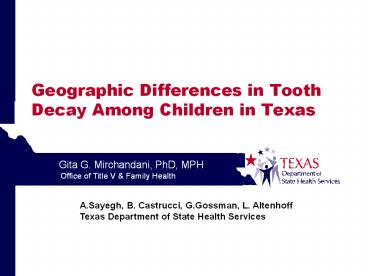Geographic Differences in Tooth Decay Among Children in Texas - PowerPoint PPT Presentation
1 / 30
Title:
Geographic Differences in Tooth Decay Among Children in Texas
Description:
Geographic Differences in Tooth Decay Among Children in Texas Gita G. Mirchandani, PhD, MPH A.Sayegh, B. Castrucci, G.Gossman, L. Altenhoff Texas Department of State ... – PowerPoint PPT presentation
Number of Views:77
Avg rating:3.0/5.0
Title: Geographic Differences in Tooth Decay Among Children in Texas
1
Geographic Differences in Tooth Decay Among
Children in Texas
- Gita G. Mirchandani, PhD, MPH
A.Sayegh, B. Castrucci, G.Gossman, L.
Altenhoff Texas Department of State Health
Services
2
Background
- Dental caries (tooth decay)--most common chronic
childhood disease - Healthy People 2010 oral health indicators
- 2 specifically address prevalence of dental
caries
3
Healthy People 2010 Objectives
- 21-1 Dental caries experience
- 21-1b. Reduce the proportion of children 6-8
years with dental caries experience in their
primary and permanent teeth
4
Healthy People 2010 Objectives
- 21-2 Untreated dental decay
- 21-2b. Reduce the proportion of children 6-8
years with untreated dental decay in primary and
permanent teeth
5
Dental Caries Experience
US
Target
Texas
6
Untreated Caries (tooth decay)
Texas
US
Target
7
- METHODS
8
Data
- Basic Screening Survey (BSS)
- August 2004-May 2006
- Sample of underserved children
- School-based 110 schools with 50 of students
on free/reduced lunch program - 17,344 Texas school children aged 2-14
9
Sample
Age Age Age
Grade 6 7 8 Total
PRE K 2 1 0 3
K 751 26 1 778
1ST 1,980 1,389 96 3,465
2ND 30 1,813 1,408 3,251
3RD 0 19 1,995 2,014
4TH 0 4 11 15
5TH 0 0 1 1
missing 1 2 0 3
Total 2,764 3,254 3,512 9,530
10
Outcome Measures
- Dental Carries Experience Proportion of children
aged 6-8 years with caries experience (treated
and untreated tooth decay) - Untreated tooth decay Proportion of children
aged 6-8 years with untreated tooth decay.
11
Explanatory Variables
- Socioeconomic status
- Not poor (Non-Free/Reduced lunch Non-Medicaid)
- Poor (Free/Reduced lunch, Non-Medicaid)
- Very poor (Free Lunch Medicaid)
12
Explanatory Variables
- Border (Yes/No)
- 32 county border region designated by the
U.S.-Mexico border health commission - Race/Ethnicity
13
Dental Caries Experience
Not Poor
Poor
Poorest
14
Dental Caries Experience
Non-Border Border
15
Untreated Caries
Poor
Not Poor
Poorest
16
Untreated Caries
Non-Border Border
17
Results
Outcome Dental Caries Experience Outcome Dental Caries Experience Outcome Dental Caries Experience
Variable OR (95 CI) AOR (95 CI)
SES
-Poor 2.05 (1.82-2.31) 1.80 (1.60-2.04)
-Poorest 2.00 (1.77-2.27) 1.85 (1.62-2.11)
Border 1.39 (1.17-1.64) 1.08 (0.96-1.27)
Race/ethnicity
-Black 1.32 (1.16-1.50) 1.10 (0.96-1.27)
-Hispanic 1.63 (1.47-1.80) 1.34 (1.20-1.50)
18
Results
Outcome Untreated Dental Caries Outcome Untreated Dental Caries Outcome Untreated Dental Caries
Variable OR (95 CI) AOR (95 CI)
SES
-Poor 2.20 (1.95-2.49) 2.08 (1.83-2.37)
-Poorest 1.20 (1.1-1.37) 1.12 (1.01-1.32)
Border 0.91 (0.78-1.01) 0.85 (0.72-0.99)
Race/ethnicity
-Black 1.22 (1.1-1.38) 1.12 (0.98-1.28)
-Hispanic 1.02 (0.77-1.35) 1.14 (1.02-1.27)
19
Conclusions
- Regardless of geography, poorer children had a
greater prevalence of ever having any tooth decay
(treated untreated) - Regardless of geography, poor children had a
greater prevalence of untreated caries than not
poor children, but prevalence decreases in the
poorest group, likely due to Medicaid
20
Conclusions
- Regardless of geography, poorer children had a
greater prevalence of ever having any tooth decay
(treated untreated) - Regardless of geography,Poor children had a
greater prevalence of untreated caries than not
poor children, but prevalence decreases in the
poorest group, likely due to Medicaid
21
Extra Slides
- EXTRA SLIDES
22
CSTE/NACDD Oral Health Indicators
- 1) Dental Visit of Adults 18 who have visited
a dentist or dental clinic in the past year. - 2)Teeth Cleaning of Adults 18 who have had
their teeth cleaned in the past year (among
adults with natural teeth who have ever visited a
dentist or dental clinic).
23
CSTE/NACDD Oral Health Indicators
- 3) Complete Tooth Loss Adults aged 65 who
have lost all of their natural teeth due to tooth
decay or gum disease. - 4) Lost 6 teeth Adults aged 65 who have
lost six or more teeth due to tooth decay or gum
disease.
24
CSTE/NACDD Oral Health Indicators
- 5) Fluoridation Status Percentage of people
served by public water systems who receive
fluoridated water. - 6) Dental Sealants Percentage of 3rd grade
students with dental sealants on at least one
permanent molar tooth.
25
CSTE/NACDD Oral Health Indicators
- 7) Carries Experience Percentage of 3rd grade
students with caries experience, including
treated and untreated tooth decay - 8) Untreated tooth decay Percentage of 3rd
grade students with untreated tooth decay.
26
CSTE/NACDD Oral Health Indicators
- 9) Cancer of the Oral Cavity Pharynx
27
Oral Health IndicatorsChildren (1)
- Carries Experience Percentage of 3rd grade
students with caries experience, including
treated and untreated tooth decay - Untreated tooth decay Percentage of 3rd grade
students with untreated tooth decay.
28
Oral Health Indicators Children (2)
- Dental Sealants Percentage of 3rd grade
students with dental sealants on at least one
permanent molar tooth.
29
Background
- Dental caries (tooth decay)--most common chronic
childhood disease - Oral health indicators developed by CSTE NACDD
- 9 indicators, 3 address children
- 2 specifically address prevalence of dental
caries
30
(No Transcript)

